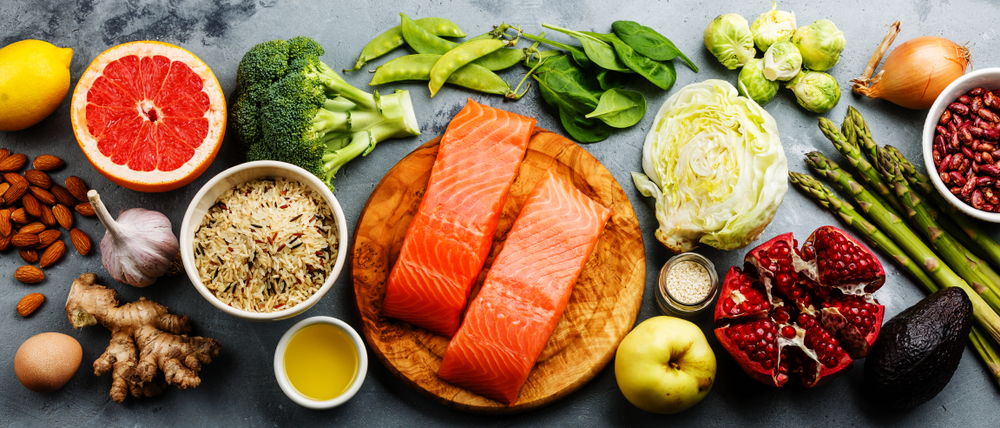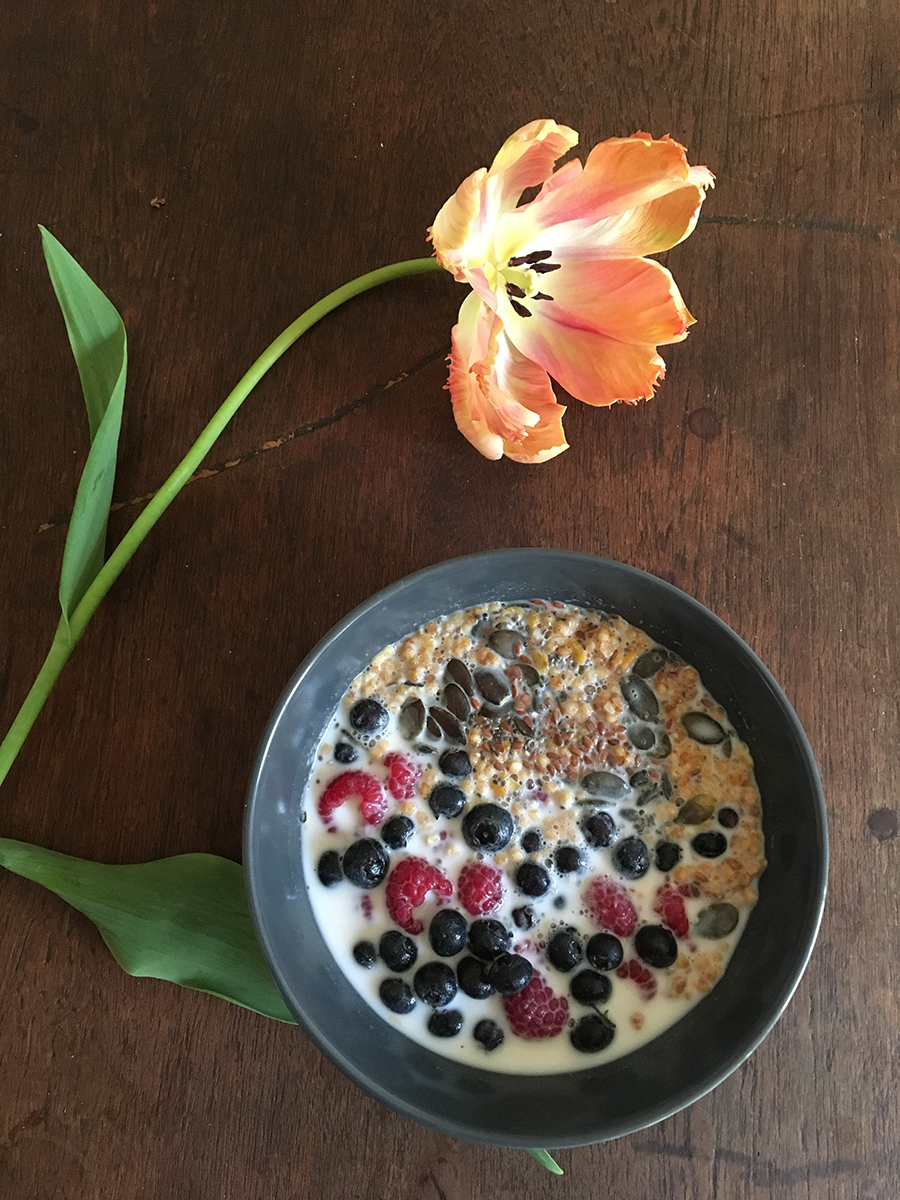Each body is unalike! We all come with different heights, body frames and shapes. But the majority of people who are in their forties and fifties agree that it is easier gaining weight than losing weight after 40, that muscle mass decreases and their energy is lower.
Losing weight after 40, and more so after 50, for many women especially, is akin to Sisyphus pushing his rock up the hill, only to have it roll down again soon after. And the old trick of dieting to shed a few pounds no longer seems to be working.
For some, it feels like a constant battle and it is depressing. So, how do you win the war against fat and increase your energy level enduringly in middle age?
Following are the 5 main factors you should bring your attention to, in order to initiate the changes that lead to lasting weight loss, when you get to midlife.
1. Your unbalanced nutrition makes it hard maintaining and losing weight after 40
Food choices are of course one of the main reasons you keep gaining weight and have a hard time losing weight after 40. My new clients often tell me they feel they “eat healthy”. But, that impression changes once we start exploring more closely their eating habits.
There are many reasons that may contribute to throwing the way you eat off balance. Some of the most common :
- You may never have questioned unhealthy food habits that come from childhood. Undeniably, most people didn’t necessarily grow up in a household that had healthy eating habits.
However, your food choices are influenced by what was served at home while growing up. This is where you learned to like or dislike certain foods, and even associate some of them with positive or negatives emotions, reinforcing certain inclinations.
- You eat a lot of processed foods. You don’t read labels and trust what a package says (“healthy”,”whole grains”, etc). But, our food supply has changed a lot. And even though there is a resurgence for “farm to table”, most people still buy their food from supermarkets.
But, food manufacturers are not concerned about your health. They simply want to ensure you buy more of their “processed foods” and count on the ever increasing taste for convenience of consumers.
So, they make price, shelf life and taste attractive, hiding behind unknown ingredients. In their labs, to get you hooked, they come up with food and flavor combinations to which are added many things that are not good for your health: sugars and syrups, starches, salt, unhealthy fats, conservatives, additives, herbicides, etc.
For example: Cheerios Oat cereals’ packaging highlights whole grains. But, they are filled with added sugar. One serving will set you back 15g, close to the daily limit of 20g you should watch for!
- You rely on a mix of contradicting information from the internet to create your own diet. You may even have created your own food theory to justify some of your eating patterns. But in the end, you may be eating meals that are not balanced for energy, leaving you primed for overeating.
- Unbeknownst to you, you may even be eating foods that reinforce your cravings. Many foods will cause the release of hormones in the brain’s pleasure and reward area. So you crave for more. Yes food addiction is real.
- You don’t cook much at home and eat out a lot and have no control over portions and ingredients in the dishes. Maybe your responsibilities at work have you entertain clients out a lot or maybe it is simply a pattern you have fallen into.
- Finally, you still turn to the huge diet industry to accelerate the process. But how many people do you know, who have successfully lost weight on a diet and kept it down for over 5 years?
As I explained in “Why Diets don’t Work”, diets work while you are on them since you are restricting yourself. But when you stop the diet, if you don’t change your eating habits, slowly but surely, the weight creeps back up. You may even gain back more!
So yes, what you eat has a major impact in your 40s and beyond. In addition to gaining weight, you will feel tired and moody if your keep unhealthy eating habits.

To nurture a healthy body weight, to support your vitality, your mental fitness and state of mind, turn your attention to the quality of your energy input. Your foods must be balanced and rich in nutriments for your body and brain to thrive.
2. You are moving less and less
As urbanization and the service sector have taken over, sedentary living and physical inactivity have taken root. And they cause more problems as we get older.
In today’s society, most people rely heavily on their car to get around. And with increasing dependence on technology, more and more careers are spent in front of a computer. With remote work, make that a whole day without movement!
“In recent decades, affluent populations have become increasingly sedentary, with many adults spending 70% or more of their waking hours sitting.” (1)
In 1970, 2 in 10 working Americans were in light activity jobs (predominantly sitting at a desk). By 2003, nearly 6 in 10 working adults used a computer on the job and more than 9 in 10 children used computers in school.(1)
In addition to being more sedentary, few people deliberately engage in regular physical activity. “Only 24.0% of adults met physical activity guidelines in 2018, and many adults spend a large portion of their time being sedentary. (2)
“ Since 2012, physical inactivity has become the first cause of preventable mortality in the world, and is responsible for more deaths than smoking.” (1)
And with age, as family commitments and professional responsibilities increase, the trend increases. “Inactivity prevalence significantly increased with increasing age and was 25.4% among adults aged 50–64 years, 26.9% among those aged 65–74 years, and 35.3% among those aged ≥75 years.” (3) Lack of physical activity is also more prevalent in women than in men.
At the same time that people are more sedentary and lack physical activity, gaining weight after 40 years old is more common. 71.6% of adults were overweight in 2015-2016, including 39.8% of adults who were obese. (4)
Engaging in regular physical activities that you enjoy is a pillar of a healthy lifestyle. Our bodies are built to move. And as we will see next, exercising is fundamental to managing the metabolism after 40.
3. Losing weight after 40 is harder as your metabolism keeps slowing down
Indeed, one of the detriments of lack of physical activity is that the metabolic rate does not get an opportunity to increase. Since your metabolism continues slowing down as you get in yours forties, your body burns less calories.
Metabolism is the process by which the body converts the calories you eat into energy. It is a central process since this energy is used by the body to perform all of its functions.
Even when you are sleeping, your body performs many functions such as breathing, blood circulation, cells growth and repair, and hormone regulation. The rate at which these basic functions are processed is called Basic Metabolic Rate.
And the Basic Metabolic Rate for each individual depends on many factors, namely:
- Your gender which affects your body composition. Women have less muscle and more body fat than men, which is why they burn less calories than a man would at the same age and weight. This is why women also should eat less than a man.
- Your body size thus also affects its composition. Bigger people need more energy to perform their basic functions.
- As we age, muscles decreases and fat increases, so a person will burn more slowly the calories ingested.
This explains why as you reach middle-age, if you keep eating the same foods and portions and move less, especially if you are a woman, your weight will keep creeping up.

Truly, physical activity is not just the best way to boost your metabolism, it is an essential part of losing weight after 40. Cardio and muscle building exercises help you burn fat more efficiently. They also increase your energy, lift your mood and protect your body from early aging.
4. The quality of your sleep affects weight-related hormones
Some hormones play an essential role in relation to weight because they change how we feel and influence food choices.
These weight-related hormones are particularly sensitive to the quality of our sleep. This is why sleep is key to manage weight, especially for women around their fifties.
Humans are sleeping less
But first, did you know that people around the world sleep on average 1H30 less than 50 years ago?
Many lifestyle changes have contributed to depleting sleep:
- Today, work has moved almost completely indoors for a large part of the active population. So most of us bath daylong in artificial light.
- Our attention is monopolized by digital screens and blue light signaling to our brain it is daytime, that we should be awake.
- More and more people suffer from insomnia or sleep issues and resort to artificially-induced sleep by medication, which is not quality sleep.
- In the workplace, many professionals and entrepreneurs mistakenly believe that sleeping less helps them do more and is a sign of their performance. Boasting about how little sleep one needs still prevails!
And, as years go by, sleep naturally becomes lighter and more restless. It is particularly true for women before and around menopause. That is when hormonal imbalance, specifically the gradual decrease of estrogen and progesterone, result in sleep issues.
How lack of sleep hinders your losing weight after 40?
Insomnia or awakening during the night in a pool of cold sweat due to hot flashes makes you feel exhausted. They drain your energy and mood, and also affect your weight. For women who are already prone to storing more fat than men, gaining weight is common, particularly around the waist.
Science shows that lack of sleep perturbs all systems in the body.

First, it includes the main hormones that regulate our satiety: Ghrelin stimulates appetite and leptin signals fullness. When a person doesn’t get adequate sleep, the levels of ghrelin will increase while the levels of leptin will decrease. So, they’re hungrier and don’t feel full as long.
Have you ever partied late, slept poorly and then awakened to an intense craving for the greasiest and most carb-filled brunch. Many studies have shown that lack of sleep increases our appetite for lipids and carbohydrates.
Second, insulin must also be stabilized. Insulin, the hormone that helps regulate our blood glucose, is triggered by certain food we eat. So, when you eat a meal too close to bedtime, sleep is disrupted, because blood glucose levels never go down and insulin stays too high.
Why? While sleeping and not moving, you expend little energy. Plus, your brain, by far the largest consumer of glucose, decreases it functions. So you burn less glucose. If you eat too close to bedtime, your blood sugar will take 6H to decrease, instead of 3H during daytime.
You can see how lack of sleep throws weight-related hormones off balance. Adopting habits that foster sleep quality and duration is a priority when you are in your forties.
Sleep is crucial to maintain your vitality, to support your mood, your cognitive functions and your longevity. It is also fundamental to succeed at losing weight after 40 lastingly.
5. Stress also impacts a hormone that makes you gain weight after 40
As time passes, life brings its lot of trials and difficulties and responsibilities at work increase as careers progress. Add to that the challenges of today’s world. There are countless reasons to feel overwhelmed.
Stress, which touches more and more people, affects both the physical and mental balance. And among its effects, it contributes to weight gain.
When a stressful situation arises, your body is hardwired to mobilize for survival. It goes through the same stress response (flight-fight) that our hunter-gatherers ancestors used to experience when they met danger.
Cortisol is one of the the hormones released by the adrenals during this “survival” mode. Cortisol is the stress hormone by excellence because it mobilizes to ensure there is energy to survive the threatening situation. To do so, it metabolizes all carbs and fats available and it stimulates the supply of glucose.
When the “threats” are occasional, stress does not cause a problem, because cortisol will go back down and stabilize. But in our modern society, stress is chronic because stressful situations are omnipresent in our day-to-day. So cortisol levels stay constantly high.
As a result, your body constantly wants to hoard glucose to “survive” the stressful situations. But high blood sugar means greater sugar consumption and cravings.
It also means more insulin release to handle the increase in blood sugar. Insulin will stores the excess glucose as fat, to be readily available, around your mid-section.
And at night, stress also affects your sleep. If cortisol is high at night, when it should be at its lowest, you will not get restorative sleep. And that is also a stress.
In the end, the prevalent chronic stress in today’s world creates a vicious cycle. By causing continual high cortisol levels to survive stress, high blood sugar and insulin levels make you constantly need more sugar.
Add to that lack of sleep, where high ghrelin and lower leptin reinforce your hunger and lower your feeling full. You now have a perfect storm to increase fat and weight.
Therefore, it is crucial to improve sleep quality and learn to manage stress in order to regulate weight-related hormones. You can see how this is key to losing weight after 40, and more so after 50.

In conclusion
My own experience in my forties led me on a quest to manage my weight and stress, and to increase my vital energy. This is when I started studying to understand mind/body mechanisms. I wanted to help others improve their self-confidence and quality of life, so they can thrive well beyond middle age.
Have no doubt, these life stages can actually lead to an empowering renewal. For women especially, losing weight and fostering vitality, better cognitive functions and a stronger mental, emotional state will support fulfillment in life and performance at work.
Integrative Nutrition offers a global and holistic approach using mind/body self-care to address all the factors that lead to weight gain and difficulty losing weight after 40 and beyond:
- Optimal nutrition for body and brain function
- Cardio and strength-training to improve metabolism, reinforce the body, to expend more energy and burn fat more efficiently.
- Foster restorative quality sleep.
- Examine and alleviate sources of stress and learning to manage how we handle stressful situations. Notably by incorporating regular relaxation and simple mindfulness practices.
If you are considering support that is tailor-made to your needs and circumstances to set up your own self-care habit, I invite you to take advantage of the complementary coaching session that you can reserve below.
This is a completely risk-free opportunity to find out whether Integrative Nutrition coaching is the solution you have been looking for to lose weight for the long run.
Vous souhaitez savoir si mes programmes de coaching répondent à vos besoins?
- https://www.ncbi.nlm.nih.gov/pmc/articles/PMC2996155/
- https://health.gov/sites/default/files/2019-09/Physical_Activity_Guidelines_2nd_edition.pdf#page=55
- https://www.americashealthrankings.org/explore/annual/measure/Sedentary/state/ALL
- https://www.cdc.gov/mmwr/volumes/65/wr/mm6536a3.htm
- https://www.cdc.gov/nchs/data/hus/2018/021.pdf
- https://www.santepubliquefrance.fr/determinants-de-sante/nutrition-et-activite-physique/documents/article/activite-physique-et-sedentarite-dans-la-population-francaise.-situation-en-2014-2016-et-evolution-depuis-2006-2007





4 thoughts on “5 reasons why losing weight after 40 is harder”
Great article! And, yes, it is rare to get a good night’s sleep! I wake up at 1:30 every night to go to the bathroom and then my mind starts thinking of everything I need to do and I can’t fall back to sleep.
Thank you so very much lady! Getting the hang of it 🙂 Yes, waking up at the same time during the night happens during a light sleep stage. Plus if you’re stressed, it triggers the flight-fight response in the sympathetic nervous system, your brain switches from sleep to awake mode. If you manage to get back to sleep in the next 5-20 mins it is ok. But no matter what, I would advise regular mindfulness practices like the body scan. Any practice that involves breathing will help because it will activate the parasympathetic nervous system, which is the break to the stress response. Xoxo
It’s a long read ,, I read it most of it anyway ..
I’m 63 trying to detox and lost 20 lbs no drinking and no meats , a bit of fish ,, cod or trout.. I read what you posted it’s a lot to take in kind regards
Terrence
Hello Terrence
Thank you for reading to the end. I know it’s a lot of info but it is necessary because 600 words would not tell the whole story of why it is harder as we age. Sounds like you have already made some changes with foods that are working. After 60, to detox you must move as well and I mean both cardio and strength training. Dont hesitate to book a session to discuss. First is free! Take care of yourself,
Cassis